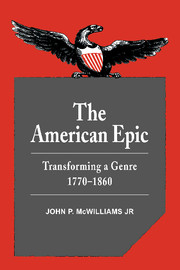1 - Invocations
Published online by Cambridge University Press: 22 March 2010
Summary
There shall be sung another golden age,
The rise of empire and of arts,
The good and great inspiring epic rage,
The wisest heads and noblest hearts.
Not such as Europe breeds in her decay;
Such as she bred when fresh and young,
When heav'nly flame did animate her clay,
By future poets shall be sung.
Westward the course of empire takes its way;
The four first acts already past,
The fifth shall close the drama with the day;
Time's noblest offspring is the last.
George Berkeley, “Verses on the Prospect of Planting Arts and Learning in America” (1752)THE NEED
The last act of epic poetry, Americans have long suspected, must create the future, not memorialize the past. Among the rising glories that Brackenridge and Freneau envisioned, even before the Revolution, was the presence of a great indigenous poet:
I see a Homer and a Milton rise,
In all the pomp and majesty of song,
Which gives immortal vigour to the deeds
Atchieved by Heroes in the fields of fame.
Shortly after the Peace of Paris, John Adams urged John Trumbull to raise his literary ambitions beyond the Hudibrastic mock epic: “I should hope to live to see our young America in Possession of an Heroic Poem, equal to those the most esteemed in any Country.” In the 1840s, after at least twelve American epic poems had been published, Emerson regretted that “We have yet had no genius in America, with tyrannous eye, which knew the value of our incomparable materials, and saw, in the barbarism and materialism of the times, another carnival of the same gods whose picture he so much admires in Homer.”
- Type
- Chapter
- Information
- The American EpicTransforming a Genre, 1770–1860, pp. 15 - 41Publisher: Cambridge University PressPrint publication year: 1989

